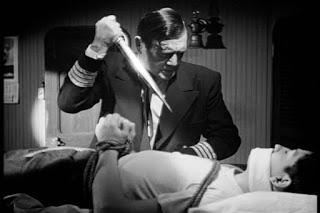
"There are some captains who would hold this against you!"
For decades, The Ghost Ship (1943) became Val Lewton's most obscure film. Two writers sued RKO for plagiarism, causing the studio to yank the film from theaters. Save intermittent midnight television screenings, remained inaccessible until falling out of copyright in 1991, whereupon cineastes embraced it as a cult classic.Tom Miriam (Russell Wade) signs on as Third Officer for the freighter Altair. Initially he befriends Captain Stone (Richard Dix), a rigid but chatty man obsessed with authority. Then several mysterious incidents (an accident involving a hook, a crewmember's death) convince Miriam that Stone's less inflexible than insane. When Miriam relays his suspicions to the crew, he's branded a pariah. Accidentally booked on the ship's return voyage, he finds Stone eager to prove Miriam's suspicions. Only Finn (Skelton Knaggs), the mute helmsman, takes Miriam's warnings seriously.
A well-executed chamber drama, The Ghost Ship makes the most of its simple conflict. Captain Stone is a wonderfully complex villain, a mix between Jack London's Wolf Larsen and Fritz Lang's Hans Beckert: he relishes life-or-death power over his crew while wondering if he. In a beautiful interlude, Stone confides to his lover (Edith Barrett) that he fears losing his mind. He tries mentoring Miriam, who grows disgusted by Stone's authoritarian amorality. Still, the crew refuses to challenge Stone's power ("I like my job and I want to keep it"), allowing the Captain to frame Miriam as first ungrateful, than mad himself.
The compressed setting gives director Mark Robson fewer chances for showmanship than The Seventh Victim, despite using maritime sets from Lew Landers' Pacific Liner (1939). An early set piece shows the crew wrangling a runaway hook, a dizzying sequence as the object smashes lifeboats and scattered crewmembers. It climaxes in a violent knife fight, contrasted with the crew's joyous sea shanty. Some elements aren't entirely convincing (the mute Finn's intermittent, over-obvious narration) but it's still a good exercise in efficiency.
Richard Dix gets a plum role, using his natural stiffness to conceal Stone's unspooling madness. When Dix confesses his self-doubt and later, goes nuts outright, it's genuinely powerful. Russell Wade makes a fine contrast, clean-cut and naïve against Dix's rigid psychosis. Lawrence Tierney makes his film debut as one of Stone's victims; Edith Barrett, Sir Lancelot and Ben Baird all appeared in previous Lewton efforts.
The Ghost Ship isn't Val Lewton's most accomplished work, but it's impressive as a marvel of economy. It's The Sea Wolf with a dash of Edgar Allan Poe, a wonderfully compact psycho thriller.

